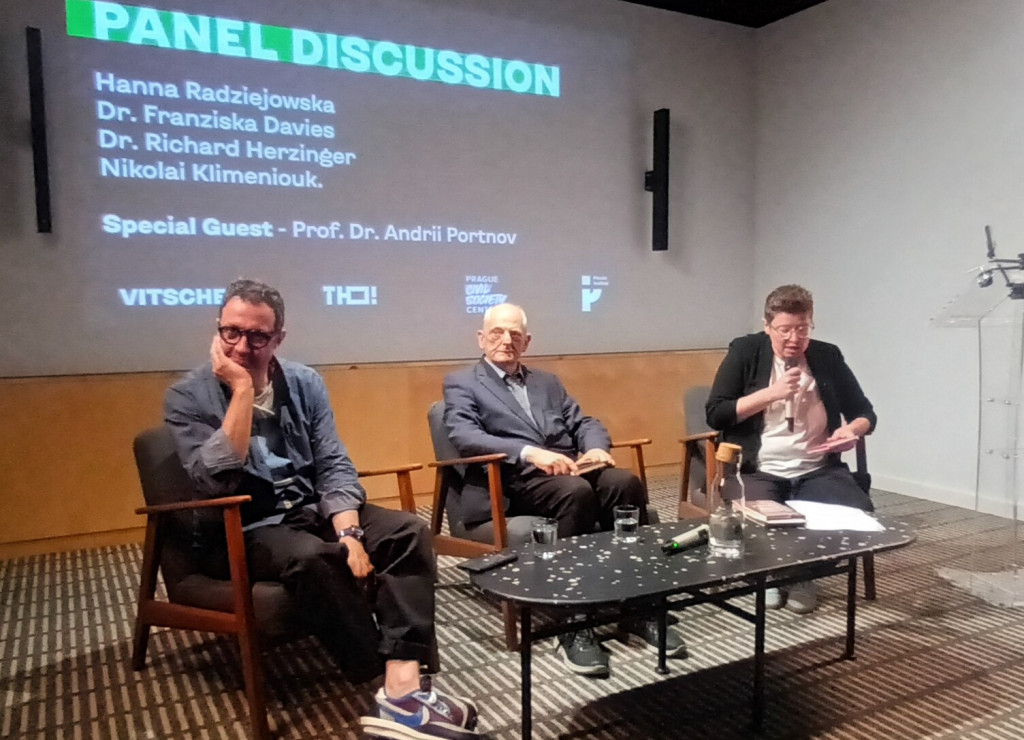With the Interdisciplinary Memory Project “Checkpoint Peace”, the Berlin-based Ukrainian association Vitsche has expiored the roots of misguided German conceptions of “peace”. The project included art actions, performances, political rallies as well as the publication of four (English-language) essays on the subject. The text I contributed deals with the background of German illusions in lasting peace and stability as well as in Russia´s readiness for peaceful cooperation following German´s unification in 1989/90:
For decades, Germany’s policy towards Russia followed the principle: what must not be, cannot be. The idea that Russia was a “partner” – albeit an increasingly “difficult” one – that was indispensable both economically and in terms of security policy took on the status of an unquestionable creed across ideological camps.
After the fall of the Berlin Wall and the collapse of the Soviet Empire, the slogan of “the end of history” made the rounds. For Germany, the upheaval of 1989/90 indeed seemed to have resulted in reaching the optimum history can offer: The country was united by peaceful means, in democracy and prosperity. As a result, Germans weren´t ready to admit to themselves that the ideal state of affairs they seemed to have achieved in 1990 was not the last word in history. This, in psychological terms, explains to a certain extent why German politics and society were so reluctant to respond firmly and adequately to new threats against peace and freedom, like in the first place Russian increasing aggressiveness.
The “Gorbi” Myth
The idealization of Mikail Gorbachev, or “Gorbi”, as he was fondly called in Germany , was crucial for the illusionary idea that Europe now was finally pacified and Germany, as the phrase went, henceforth only “surrounded by friends”. The German narrative of the liberation years 1989/90 pointedly spoken boils down to the assessment, that “Gorbi” gave freedom to Europe and unity to the Germans out of generosity and due to his genuine humanistic convictions. This overlooked the fact that the purpose of the Kremlin leader´s endeavor to reform the communist system was to preserve it. And that, as in the Baltics in January 1991, he was ready to use lethal violence against peaceful demonstrators to secure the continued existence of the Soviet Union.
Yet, out of a special feeling of gratitude and admiration towards Gorbachev for what they thought he had done for them, Germans felt he deserved to be backed up at any rate. This sympathy was mixed with concern that the dissolution of the Soviet Union could lead to chaos. This attitude later was applied to the Russian Federation, which now in the same way was regarded as an indispensable factor of stability – despite the fact that already under Yeltsin the Kremlin waged a brutal military campaign in Chechnya and stood behind Serbia’s genocidal war in Bosnia and Kosovo. But all this has been largely ignored or even glossed over by the West in general and Germany in particular.
This ignorance finally solidified into the conviction that a stable peace order in Europe depended primarily on Russia’s goodwill, which had to be made gracious and willing to cooperate. This led to the German belief that there would be “no security in Europe without Russia”, which was used to justify the chronic indulgence towards the increasingly aggressive and violent Putinist power apparatus.
Fear and Fascination
German Social Democrats in particular – but not only them – drew the wrong lesson from the policy of détente since the 1970s, that if one only persists enough in “dialogue” and economic cooperation, even totalitarian enemies of democracy would become friendly and “liberalize” in the long run. It was suppressed that the decline of the Soviet empire had been primarily due to massive military deterrence – and that Gorbachev’s reform policy only came about after the Soviet Union had suffered devastating setbacks. In the early 1980s, the Kremlin had failed in its attempt to dissuade the Europeans (and primarily Germany) from the NATO rearmament decision and thus separate them from the US. In addition, the Soviets had become entangled in a hopeless, bloody colonial war in Afghanistan.
Subliminal or open anti-Americanism provides a strong motivation for large parts of the German public to appease the Russian regime. To lean on Russia to gain greater independence from the US has for a long time been a seductive perspective for forces on both the left and the right. Which points to the fact, that material, political and moral corruption by the Russian regime is a major, but by no means the only reason why leading voices in Germany repeatedly turn into loudspeakers of the Kremlin’s propaganda. Their willingness to excuse Putin’s autocracy has deep roots in German history of ideas.
Since the early 19th century, German thinkers have developed a mythical image of Russia that oscillates between fear and fascination. On the one hand, Russia was perceived as sinister and threatening because this huge country was „uncivilized“ and driven by archaic instincts. On the other hand, it is precisely this supposed rawness and irrationality that has been glorified as the expression of an unadulterated spiritual and moral purity of „the Russian people“.
“Affinity of Souls”
Some of the greatest minds of German intellectual life contributed to this stereotype. In 1889, the philosopher Friedrich Nietzsche called Russia „the only power that today has duration in its body, that can wait, that can still promise something.“ Russia was the „opposite term to the pathetic European petty statehood and nervousness“. The poet Rainer Maria Rilke wrote in 1920 that Russia had „made him what I am“, and that he had found his „inner origin“ there. Russia, explained Rilke, is „the land of the unfinished God, and from all the gestures of the people the warmth of his becoming emanates like an infinite blessing.“
In his „Reflections of an Apolitical“ of 1918, Thomas Mann fit this rapturous longing for Russia into a cultural-historical pattern of contrast, with Germans and Russians on the one hand and the Western democracies on the other. In Mann´s view, both German and Russian „culture“ oppose the presumptuous „imperialism“ and the mindless and soulless, rationalistic „civilization“ of the West. That´s why Mann saw both peoples being connected by a deep “affinity of souls”.
Before Nazi barbarism with its murderous racist hatred of „Slavic subhumans“ ended these efforts, the alliance of Germany and Russia against the West was a preferred option for significant sections of the German nationalist right. „National Bolsheviks“ such as the philosopher Moeller van den Bruck and the publicist Ernst Niekisch – who switched from the extreme left to the extreme right and finally ended up as a member of the GDR state party SED – in the 1920s and 1930s identified the October Revolution as an anti-Western return to Russian „folkish“ („völkisch“) roots and thus a blueprint for their own „national revolution“.
Only Russia?
That´s how also Joseph Goebbels, who celebrated Lenin as a great Russian nationalist leader, thought until the late 1920s. After the First World War, the Red Army and the German Reichswehr had cooperated in the secret rearmament of Germany. In the Hitler-Stalin Pact of 1939-41, the vision of the German-Russian alliance against the West briefly flared up again – with the well-known devastating consequences.
By identifying with Russia as a supposed victim of Western arrogance, German Putin sympathizers and appeasers are projectively expressing their resentment against Germany’s democratic transformation under the supervision of the Western Allies after World War II. They thus show that Germany’s deep integration into the West has never been fully accepted by large parts of German society. In order to call for consideration and indulgence towards the Putin regime, responsibility for the German crimes against the peoples of the Soviet Union in the Second World War is repeatedly invoked today. As essential as it is in fact to be aware of this responsibility any time, it is dubious if the associated historical sensitivity is demanded solely for Russia.
Since, after all, the Soviet Union consisted not only of Russia, but also of nations such as Ukraine and Belarus, which were suffering most from German Nazi occupation. These now independent countries, however, today are the target of aggression and obstruction on part of the Kremlin with regard to their right to democratic self-determination. The only correct consequence of Germany’s dark history today is to support Ukraine in its struggle for freedom and human dignity by all necessary means.

Hanna Radziejowska (r.), Nikolai Klimeniouk (l.) and me (c.) on a panel at the occasion of a “Checkpoint Peace” project presentation on July 28

